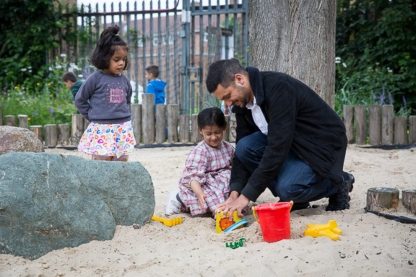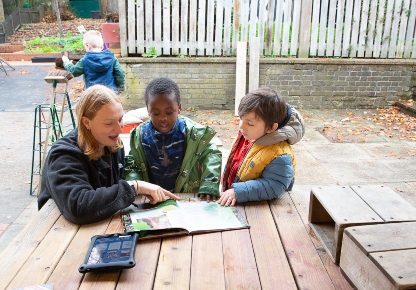An article by Dr Kyara Rojas-Bustos, Honorary Fellow, University of Roehampton on how a Froebelian approach can nurture linguistic diversity in early years settings and support young children with English as an additional language.
If you enter an early years setting or school in London (or in many other places in the UK), it is very likely that you will come across a large number of young children who are growing up speaking languages other than English at home. The experience can be overwhelming for many educators who encounter great diversity of languages for the first time.
In this article, I revisit a few of Froebel’s principles of education to reflect upon the way in which we could support babies, toddlers and young children who are learning more than one language.
Rather than keeping home language at home, I invite educators to re-think learning spaces to embrace and enable linguistic diversity in the setting.
Building relationships with the child and the family, embracing their diversity within the wider society, maximises opportunities for inclusive education.
Autonomous learners
Recognising that babies, toddlers and young children are unique is the starting point from which to appreciate the real value that home language has in their life and, particularly, in their learning.
Froebelian principles promote educational approaches in which children’s intrinsic motivation and their active role in their own learning help them to flourish in rich learning environments (Bruce, 2012). Hence, children who are learning English as an additional language bring with them their linguistic background, identity and cultural assets, as well as the funds of knowledge they have accumulated during their early experiences (Kelly, 2010). In early years settings, they will continue this exploration of their environment, starting from who they are and what they have. For example:
- Forming meaningful friendships with other children, which can help to facilitate recent arrivals’ exploration of their new learning environment. Even within non-verbal interactions, children have shown amazing communication skills that go beyond language differences.
- Using a home language in the setting with other children who speak the same language helps them to make connections with “their intellectual life, everyday life [and] emotional life of feelings and relationships” (Bruce, 2012, p. 16).
Relationship matters
Welcoming children and their families (and making them feel welcomed) is integral to Froebelian practice. This is not about instructing parents; it is about (re)empowering them to value their contribution and their understanding of their own children (Bruce, 2021) and may involve helping them to recognise and nurture the value in their child's play and learning.
When a child speaks another language, the parents (and extended family) are the experts, the ones who are competent in the other language/s (Rojas-Bustos, 2020). Building relationships with the child and the family, embracing diversity within the wider society, maximises opportunities for inclusive education. For example:
- Parents can be invited to participate in activities such as reading books, telling stories or singing songs in their home language.
- Educators should check that literacy resources and activities in the setting are representative of linguistic diversity of the community (Chumak-Horbatsch, 2012).

Unity and connectedness
Home language(s) will be the starting point for the child to make sense of the world. “Children are whole beings whose thoughts, feelings and actions are interrelated” (Froebel Trust, n.d.) and the artificial division between home language and setting language is not beneficial to their “holistic way of learning”.
Interdisciplinary research, combining cognitive science, psycholinguistics and psychology, has shown that learning more than one language from a young age helps the development of many cognitive, linguistic, metacognitive and metalinguistic skills that are transferred to children’s learning (Sorace, 2019). For example:
- “How do you say this in [insert here the language of the child]?” can be a fascinating way to facilitate connections so that children can make sense of the world around them.
- Parents can be our allies in extending children’s learning. Encourage parents to keep using the home language as much as possible, talking – in their home language – about the child’s interests and their new discoveries in the setting.
- Practitioners who speak the same language/s as the children can be encouraged to use those languages in the classroom (Chumak-Horbatsch, 2012).
Knowledgeable and nurturing educators
This invitation is not about asking educators to learn another language and/or teach children other languages. By allowing language diversity in the setting, we are not relegating English from its position as a mainstream language.
Froebel educators facilitate and guide, providing the linguistic models for children’s own exploration of English, extending their grammar and vocabulary, making connections with home language, and supporting and extending children’s own interests.
Envisioning learning spaces in which language diversity is embraced and encouraged (rather than silenced and invisible) is in line with the Froebelian legacy in early years pedagogy.
-
About the author
By Dr Kyara Rojas-Bustos is an Honorary Fellow, University of Roehampton. She has worked in special education and higher education in both Chile and England, developing a sound knowledge of curriculum development and creating collaborative environments where everybody can excel.
Kyara created this short article during the Froebel Trust's Writing Workshop held in Summer 2022.
References
Bruce, T. (2021) Friedrich Froebel: A Critical Introduction to Key Themes and Debates, London: Bloomsbury
Bruce, T. (2012) The whole child, in Bruce, T. (ed.) Early Childhood Practice: Froebel Today, London: SAGE , pp. 5-16
Chumak-Horbatsch, R. (2012) Linguistically Appropriate Practice: A Guide for Working with Young Immigrant Children, Toronto: University of Toronto Press
Froebel Trust (n.d.) Froebelian principles, Poster printed and distributed by Froebel Trust
Kelly, C. (2010) Hidden Worlds: Young Children Learning Literacy in Multicultural Contexts, London: Trentham Books
Rojas-Bustos, K. (2020) The invisibility of “other languages” in an early years language program in England: an examination of monolingual discourses and ways to forge culturally inclusive practice, Journal of Research in Childhood Education 34(1), pp. 28-42
Sorace, A. (2019) Referring expressions and executive functions in bilingualism, in Sekerina, I. A., Spradlin, L. and Valian, V. (eds) (2019) Bilingualism, Executive Function, and Beyond: Questions and Insights (Studies in Bilingualism series?, volume 57), John Benjamins Publishing Company, pp. 131-146


